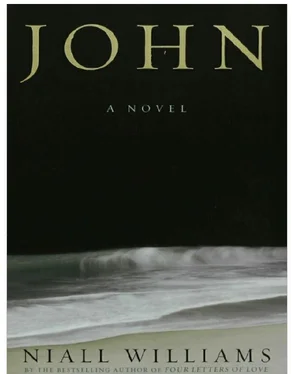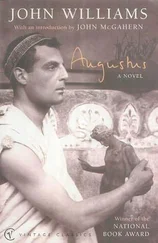Marina drinks from Papias's hand. She thinks he may be an angel and this some threshold before another world. She expects the faces of her children. She expects them in winged form in the space above his head. Her husband, she hopes, is in another place, where devils rent his soul asunder.
'Sit,' Papias says, and brings her slight weight against the wall. He does not know clearly why he is come. He tells himself he came to see if she was dying like Prochorus and if he could administer to her and pray for her soul. He tells himself he does not believe he carried the contagion from her to the scribe, but the fear is there nonetheless. If so, why has he been spared? On his hands, on his face in the sea pools he has seen no sign. The serpent devil he saw has left him quivering, like a stringed instrument in after-play.
He goes to the small bench to find lamp oil or candle, but sees neither. The rat recrosses the earth floor, and he shouts at it, stamps his sandal, so it darts out beneath the broken end boards of the door. He finds a cloth and dips it in the bucket and brings it to her. With a gentleness he has forgotten is in himself, he washes her face. He has never touched the face of a woman before. Her eyes are open. Water trickles down her neck. Her lips, blistered and swollen, part. She looks above him for spirits winged, then directly at him.
'You,' she says.
'I am Papias,' he says, 'a Christian. You remember?'
'My children are dead.'
'Yes. I have buried them outside. I have prayed for their souls.'
'Am I dead?'
'No. You are living.'
She groans at this, turns her face sideways into the ragged fall of her hair.
Papias feels the fierce hold of temptation then. He is seized by it. His desire does not take the form more easily defeated: it is not her body that draws him. More forcefully it is the idea of saving her soul. He is compelled by the notion that she is one he has come across on his way, one who has fallen into his very path, and that the reason for this must be that he is to save her. It is part of his purpose. The steps to this understanding he leaps three at a time. It is wonderful. Here, the Lord has given him this poor woman to whom he can administer salvation. She will be the first of his congregation, his church of one. The realisation is a sharp thrill. It polishes his eyes with desire.
'Your children are in heaven above,' he tells her.
From sipping at the water, Marina regains herself. 'The devil took them.'
'No.'
'The devil is my hands.'
'No. They are with the Lord.'
'What kind of cruel Lord is he that is same as the devil?' She spits the question at him.
Papias bites his lip. 'The Lord is not cruel,' he says. 'His ways are merciful. But they are mysterious.'
'Bring me a knife, and I will show you. There is no mystery. My children are dead.'
'It is sad, and you grieve. But you have been spared.'
'I do not want to be spared. If there is a Lord, he has forgotten me. He has left me behind like a fish too many for his basket. Bring me the knife.'
'No. You must not say such things. He is merciful. You will be well.'
'My husband is dead! My children are dead!' she screams at him. 'I am with demons; they are in my hands, in my breath!' She blows an air stale and putrid toward him. 'I breathe death.'
Papias draws back. No, it cannot be. If it were so, he himself would be ill already. It was chance. It was the design of the Lord to take the children, and his design is so great, so beyond the understanding of simple man, a purer mathematics than can be conceived, that it is foolishness even to try. It was divine mystery. He will show this woman, Marina, the truth. He will lead her there. Already Papias feels love for her. He feels the kind of love that connects one to another in community; he feels his strength will meet her weakness, and blissfully envisions the entire world so, how it might be saved one soul at a time, how loving and forgiveness can bind each sheaf until there is a harvest so great its golden bounty will stack to the sight of the Almighty. And the Almighty will be pleased.
But even as he is settling things so in his mind, Marina is pressing herself up to stand. She is small and weak but possessed of resolve.
'Wait! Stop. You must rest,' Papias tells her.
She ignores him. In the half-dark she steps past. She knocks a reed basket, a beaked earthen cup that spins and breaks against a table leg. Her head is down and the fall of hair obscures her face. She pats the table. Papias comes behind and hoops his arms over her. He holds her tightly against himself.
'No. No, you must rest,' he says. Her hair smells of salt. But there is something of honey, too. The feel of her in his arms is so slight and yet of substance; she is a marvel, like a creature rescued from overboard, he is thinking. But she pushes out her arms against his hold and cries out. Still he clings on to her. Her head jolts back against him, knocks a sharp rap on his chin.
'Let me. Release me!'
'No.'
She thrashes her torso one way and the other, the hemp of her garment rips. Barefoot she stamps a heel on his foot. Papias yells. Still he will not let her go; he will save her. He tries to tighten his lock about her, his arms pressing across her breasts, her body doubled forward now and her head down. She fights against him. On the table before them is the long knife she uses to cut the fish heads.
'I will not let you,' Papias says. He holds her tight, his fingers dug into the soft tissue of her sides till they feel the bone. Her feet kick at his shins, stamp. Then, realising that she will not escape him so, Marina twists, spins about so she is facing Papias. Their breaths meet. Her eyes hold him, as if she sees further into him than he himself.
Papias lessens his hold. Her hand comes up like a blessing and reaches to the side of his neck, slides inside the robe and down the soft flesh of his shoulder.
Papias lowers his head toward her. She will be rescued. She will be saved. It is a victory. Love is all-powerful.
Her fingers on his skin are cool and delicious. He closes his eyes, letting himself surrender and fall towards her.
Her hand draws him down.
Then she opens her mouth and bites down with full force on his right ear.
The pain is incomprehensible at first. The wild surge of it blows open his eyes, shoots a yell from his open mouth. His hands fly up, releasing her. Still she is attached to him, her teeth fierce and unrelenting, gnawed into the very stuff of him. A pulpy blood stains her. Papias's head is bowed into the grip of her, and he is roaring now, his fingers trying to push her face from him. But still she bites down into him. The sharpness of the hurt lances into his brain, is blinding, makes him slump forward. The curls of his head are in her fists. What fury and grief is in her is set upon him.
Then, as the lance of pain presses on, spearing his mind, the woman Marina bites free the flap of his ear, and Papias falls to his knees. It lies on her lips. She spits it, steps back.
She turns to the table, having conquered the Lord of love and his spurious mysteries. She tears open her torn robe and exposes to him her breasts, her belly. Then she takes up the long-bladed knife that she uses to cut off the fish heads and two-handed plunges it into her chest.
The blood spurts out into the room. Her head jolts backwards. The knife swings, proscribes a range of angles as it protrudes from her. She stands a moment before the kneeling disciple. Upon her face freezes an expression of cruel joy. Then she falls forwards on to the floor.
The light I cannot see. The sky. The sun.
What I see is the evil of man. What I see is what grows in the darkness. But how can I cut it away? Lord, what use your gardener if he is blind?
Читать дальше










